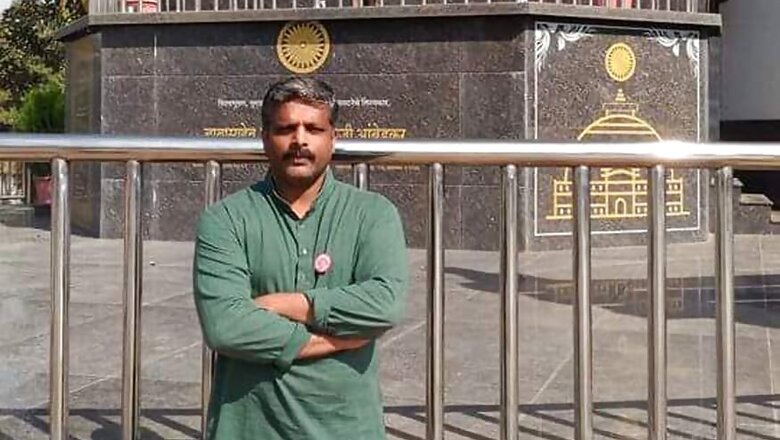
views
For Vijoo Krishnan, 44, farmers’ issues have always been close to his heart. After-all, he has grown up listening to stories of the first major uprising in the Malabar region by the peasants.
The Joint Secretary of All-India Kisan Sabha (AIKS) belongs to the same Karivellur village in Kannaur where farmers rose against the British imperialism and feudal system in 1946, and fought the landlords who wanted to smuggle paddy from the village at a time of acute starvation.
Seven decades after the Karivellur Struggle, similar demands helped Krishnan reach out to over 50,000 farmers in Maharashtra and convince them to stand up for their rights – an issue extremely close to his ideologies.
News18's Chandrakanth Viswanath speaks to Vijoo Krishnan, a former President of Jawaharlal Nehru University Students Union (JNUSU) and a firebrand leader of the Students Federation of India (SFI) who is now the Joint Secretary of All-India Kisan Sabha (AIKS), the largest farmers' organisation in the country that led the ‘Long March’ from Nashik to Mumbai this week.
Krishnan is probably the youngest member of the Central Committee of the Communist Party of India (Marxist) as an invitee. After completing a doctoral programme on the changing Indian agrarian economy, he joined St Joseph's College, Bengaluru, as the Head of the Post Graduate Department of Political Science. However, after a couple of years in teaching, he quit his job to become a full-time activist.
It was during his tenure as the president of JNU Students' Union that the administration was forced to rent a hotel outside the campus and also pay the students for their transit facing a protest over the issue of hostel fee hike.
Vijoo Krishnan was also a member of the first Gender Sensitisation Committee Against Sexual Harassment (GSCASH) after the union amended the JNUSU constitution for the first time since 1978.
Amidst his busy schedule as one of the helmsmen of the historic farmers’ agitation in Maharashtra, Vijoo Krishnan spoke to News18 from ground zero of the massive protest — Azaad Maidan.
Q. One of the tweets from CPM on the Long March was “You can cut all the flowers but you can’t stop the spring from coming!” How do you see this?
A. This is an uprising of the agrarian sector and it has been happening for the last two years. It is happening in many parts of the country such as Rajasthan, Karnataka and Madhya Pradesh apart from Maharashtra. There were various kinds of agitations prior to this and now we have an active participation of about 50,000 farmers. The participation in Rajasthan was almost equal to this or even more, however, the mainstream media had to take a note of the agitation with this. Of course this gives us hope for the future and it shows the strength of All-India Kisan Sabha.
Q. Can the Long March by farmers be considered as a resurgence of the CPM, especially in the post-Tripura scenario?
A. This is a protest by the farmers for their day-to-day survival. An atmosphere has been created against the BJP due to its policies thus it has taken a political colour. However, it cannot be linked to electoral politics. Certainly it adds strength to all forces who wish to defeat the BJP.
Q. When you say all forces against BJP, it obviously includes the Congress party too. But how can the Congress be absolved from its anti-farmer policies?
A. Both the Congress and BJP are following neo-liberal policies against the farmers. However, the BJP has infused its communal elements, too, with its programmes such as gauraksha into it. Our agitations are not limited to the BJP-ruled states only. We have also organized agitations in Karnataka, which is a Congress-ruled state.
Q. You have Maoists in the platform for the Long March while CPM has a different attitude towards Maoists in Kerala, where it is in power. Do you see the irony in this?
A. Our approach to Maoism is that it is an issue which should be addressed politically. It is a fact that a lot of comrades are also killed by the Maoists. This is an agrarian uprising where all like-minded people are associating with it in order to fight against the anti-farmer policies. It may include organizations with ultra-Left ideologies such as CPI(ML). However, in no way, can we share the credit of this march with the Maoists.
Q. How does your native village Karivelloor and its historical agrarian uprising influence this Long March?
A. The uprisings in Karivelloor, Kayoor along with Punnapra Vayalar in Kerala are a great source of energy for uprisings across the nation. This march also gives an impetus to the decision of Kisan Sabha that it should have a presence in all the villages and all the farmers should be its members.


















Comments
0 comment